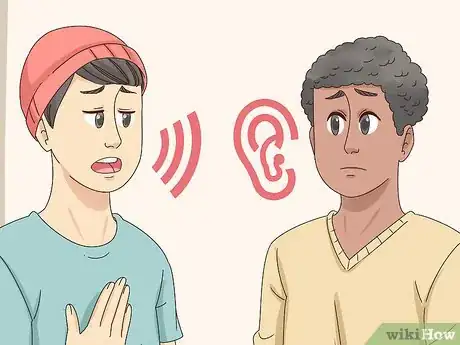This article was co-authored by Sabrina Grover, LMSW. Sabrina Grover, LMSW is a Licensed Master Social Worker (LMSW) who earned her degree in Advanced Clinical Practice from New York University. Sabrina has experience working in substance abuse recovery centers and schools where she gained experience providing evidence-based treatment to children, adolescents, adults, and families. Sabrina specializes in Dialectical, Narrative, and Cognitive Behavioral Therapies. She has particular expertise in treating clients struggling with grief, complex trauma, interpersonal difficulty, family conflict, anxiety, and depression. She commits to providing a supportive environment for everyone who commits to growth and offering a warm, non-judgmental atmosphere.
There are 13 references cited in this article, which can be found at the bottom of the page.
This article has been viewed 47,876 times.
If you're like most individuals, you have a few people in your life you consider enemies. These people seem to actively work against your success and are often negative towards you. Take time to identify your enemies, then learn more about them. It can be helpful to try to turn your enemies into allies; you may never actively like each other, but you can work together towards success rather than against each other.
Steps
Identifying Your Enemies
-
1Look for people who talk negatively about you in a destructive manner. Friends may have constructive criticism for you, but their ultimate goal is to help you. An enemy will use destructive talk with the sole purpose of making you feel worse or bringing you down.[1]
- For instance, a friend might say, "You look nice today, but have you ever considered wearing your hair a different way?"
- An enemy would say, "Your hair is ugly, and you can't do anything to change it."
-
2Notice who gossips about you. People who gossip behind your back, spreading malicious rumors or letting out your darkest secrets, are not your friends. If you find someone is gossiping about you, they're probably your enemy.[2]
- For instance, maybe you told a "friend" about something that was going on at home, like your parents getting a divorce. You asked them to keep it a secret, but they went out and told as many people as they could. In this case, the gossip is true, but they betrayed your trust.
- Another type of gossip is when a person simply makes up something about you. For instance, maybe they spread a rumor that you cheated on your boyfriend when you really didn't.
Advertisement -
3Watch for people who try to block your success. Many times, your enemies will work to take credit for what you do, particularly in a work or school environment. They may also try to stop you from succeeding by subtly sabotaging your work with your boss or your teacher. These people are definitely not your friends.[3]
- For instance, they may "forget" to tell you about a deadline you're supposed to meet.
- Maybe they saw one of your ideas that you were about to propose at work and went to your boss first to present it to them, stealing it out from under you.
-
4Pay attention to the person's body language. A person who doesn't like you will likely lean away from you, as well as turn their body away from you in conversation. They may also cross their arms or legs as a defense against you.[4]
- They might also try to stare you down, glaring at you.
- If they are trying to hide something from you, they may put their hands in their pockets or hide them away with some other method.
Observing Your Enemies to Learn about Them
-
1Estimate the person's confidence levels to figure out their motivation. Look for confidence in the person's posture and body language. A confident person will stand up straight. They make eye contact and tend to smile more. A person with low confidence or low self-esteem may slouch, avoid eye contact, and avoid interaction altogether.Once you figure out how confident a person is, you may be able to understand them better.[5]
- For instance, a person with low confidence feels bad about themselves, so they may be lashing out at you as a way to make themselves feel better.
-
2Take notes on your enemy's personality to learn how to approach them. Pay attention to how they interact with people, and take notes on their personality. For instance, are they introverted or extroverted? (Do they seem comfortable around people or not?) What do they value most? What seems to stress them out? You can use this information in your future actions with the person.[6]
- For instance, maybe you notice that they start pulling at their hair after someone dumps new work on their desk, moving up a deadline. They likely have anxiety over meeting the deadline. If you want to annoy them, pile on more work if possible. If you want to make them your ally, offer to help.
-
3Check what your enemy wears to decide how to handle them. What a person wears says a lot about who they are. For instance, someone who is meticulous about their clothing will often be meticulous in life. If you can figure out why they wear what they wear, you can understand them a bit better and approach them with that understanding.[7]
- For example, if you find a person is very meticulous, you know that when you talk to them, you should give them all the details you can, as they are detail-oriented.
- Also, people tend to dress to a particular culture, one they're comfortable in. A skateboarder might wear board shorts and casual t-shirts. A person who sees themselves as all business might wear suits or pressed slacks and a polo.
- Don't forget to look at the accessories they choose, too, such as religious symbols.
-
4Figure out when the person is lying to call their bluff. Watch the person from a distance to figure out their baseline behaviors. Maybe they fidget or jiggle their leg all the time, so looking for fidgeting won't help you when you're looking for a tell. However, notice how their behaviors change in tense situations, and you'll start learning their tells. Then, you know when the person is lying to you or another, and you can (respectfully) call them out on it when you need to.[8]
- For instance, maybe you notice that every time the boss or a teacher calls out the person, they clear their throat or play with their hair.
- If you notice the person is lying to you, you might say, "Are you sure that's true? I thought I heard it another way." Try to give them a way to save face while reverting to the truth.
Changing Your and Your Enemy's Emotional Responses
-
1Reframe how you think about your enemies' successes. Instead of thinking, "That promotion should have been mine," you can think "That promotion was never 'mine' to begin with, and I'm so glad that person has succeeded." When you celebrate others' successes, you begin to turn them from friends to enemies.[9]
- Send the person a card or flowers to help celebrate their success!
- You may make enemies out of some people because you are jealous of their success. However, someone else succeeding doesn't diminish what you've accomplished.
-
2Redirect negative emotion your enemy feels towards you to the real enemy. Often, someone has become your enemy through no fault of your own; rather, outside factors have caused them to consider you their enemy. If you can redirect the person's anger to the real cause, you work towards make them your friend instead of your enemy.[10]
- For instance, maybe your enemy is mad because you got first chair in band when they think they should have. You could say, "I know you're mad at me, but really, it was the director who put us in this uncomfortable position. You're a really talented player."
-
3Change how you interpret your enemy's behavior. When you make a decision about what a person is like, it tends to color how you view them from then on. For instance, if you think your enemy is mean, you will see all their actions as mean. However, try to give them the benefit of the doubt. When you think they've said or done something rude, consider how it could be interpreted another way.[11]
- For instance, if the person doesn't say hello when you walk in, don't automatically think it's because they're rude or evil. Maybe they just didn't see you or maybe they're having a bad day.
Turning Enemies into Allies
-
1Ask the person questions about themselves to understand them better. Show empathy towards the other person. If the person will at least talk to you, try to get to know them better. Ask them how their day is going, what they like about their job or school, and what they have going on in their life.[12]
- For instance, you could say, "Hey, how are you doing today? How are you feeling about this crazy math test?"
-
2Listen to your enemy's perspective. You may have gotten in an adversarial relationship with someone because you have different worldviews. Instead of viewing this difference as a barrier, look at as an opportunity. You have an opportunity to change how you see the world by viewing it through their eyes. It can help you grow and change how you see people.[13]
- For instance, if the person is on the other end of the political spectrum from you, you may find you have compassion for their worldview after learning why they hold the beliefs they do.
-
3Show your enemy respect. All humans deserve dignity, and you should even treat your enemies with respect. Don't try to bring them down with your words; don't gossip behind their back. Greet them with politeness every time you see them, and encourage them to share their ideas with the group even when you want to shut them down.[14]
- Try to think of your enemies with compassion. Put yourself in their shoes, and think about what they must be feeling in the moment. Plus, you never know what's going on in their home life that could be affecting their behavior.
-
4Work on finding things in common. Enemies tend to dehumanize the other person. That is, they may portray them in their minds and actions as a totally horrible person with bad taste. However, if you start to find common ground, your enemy may realize that you have more in common than they thought, and they may start to come around.[15]
- For instance, you could say, "Hey, I heard you like tabletop gaming. I got this great new game called Gloomhaven. Would you like to play sometime?"
References
- ↑ https://www.psychologytoday.com/us/blog/the-urban-scientist/201003/how-spot-friends-enemies-frenemies-and-bullies
- ↑ https://www.psychologytoday.com/us/blog/the-urban-scientist/201003/how-spot-friends-enemies-frenemies-and-bullies
- ↑ https://hbr.org/2012/05/make-your-enemies-your-allies
- ↑ https://www.psychologytoday.com/us/blog/emotional-freedom/201402/three-techniques-read-people
- ↑ https://www.psychologytoday.com/us/blog/emotional-freedom/201402/three-techniques-read-people
- ↑ https://www.inc.com/justin-bariso/an-fbi-agents-9-ways-to-read-people.html
- ↑ https://www.psychologytoday.com/us/blog/emotional-freedom/201402/three-techniques-read-people
- ↑ https://www.inc.com/justin-bariso/an-fbi-agents-9-ways-to-read-people.html
- ↑ https://www.lionsroar.com/know-your-enemy-november-2013/
- ↑ https://hbr.org/2012/05/make-your-enemies-your-allies
- ↑ https://www.psychologytoday.com/us/blog/the-science-success/201503/2-reasons-why-people-dont-get-know-the-real-you
- ↑ https://upliftconnect.com/love-your-enemies-what-does-it-mean-can-it-be-done/
- ↑ https://www.businessesgrow.com/2013/05/22/5-creative-lessons-ive-learned-from-my-enemy/
- ↑ https://upliftconnect.com/love-your-enemies-what-does-it-mean-can-it-be-done/
- ↑ https://hbr.org/2012/05/make-your-enemies-your-allies










































































